Controversies are a part of history. Explore the biggest scandals linked to William F. Buckley Jr..
William F. Buckley Jr. was a prominent American conservative intellectual, author, and political commentator. He played a significant role in shaping the modern conservative movement in the United States. As the founder and editor of the National Review, he provided a platform for conservative voices and ideas, influencing political discourse for decades. Buckley was also known for his eloquent writing style, debating skills, and his advocacy for limited government, free markets, and a strong national defense. He authored numerous books, essays, and articles, leaving a lasting legacy on American political thought.
1944: Vandalism of Protestant church
In 1944, Vidal implied that Buckley's siblings and Buckley had vandalized a Protestant church in their Sharon, Connecticut, hometown after the pastor's wife sold a house to a Jewish family
1951: Criticism on Catholicism after Publishing Book
In 1951, following the release of his book "God and Man at Yale", William F. Buckley Jr. faced criticism related to his Catholicism, including accusations of bias and suggestions to have attended a different institution.
1954: Co-Authored McCarthy and His Enemies
In 1954, William F. Buckley Jr. co-authored the book "McCarthy and His Enemies" with his brother-in-law L. Brent Bozell Jr., defending Senator Joseph McCarthy's actions against communism.
August 24, 1957: Publication of "Why the South Must Prevail"
On August 24, 1957, William F. Buckley Jr.'s editorial "Why the South Must Prevail" was published in National Review, advocating for temporary segregation in the South, arguing that the black population was not ready for equality due to a lack of education, economic standing, and cultural development. He asserted the white South's right to maintain "superior mores" until equality was achieved and defended the disenfranchisement of black voters.
1957: Attempted to Weed Ayn Rand from Conservative Movement
After 1957, William F. Buckley Jr. attempted to weed Ayn Rand out of the conservative movement by publishing Whittaker Chambers's highly unfavorable review of Rand's Atlas Shrugged.
1957: Buckley's "Letter From Spain"
In 1957, Buckley's "Letter From Spain" was published, in which William F. Buckley Jr. praised Spanish dictator General Francisco Franco as an "authentic national hero" who rescued Spain from "visionaries, ideologues, Marxists and nihilists." He also stated that Franco did not earn the right to govern absolutely.
1957: Welch Expressed Doubts About Eisenhower's Loyalties
In 1957, Robert Welch expressed doubts about President Eisenhower's loyalties, leading to disagreements with Buckley about the reasons for the United States' perceived failure in the Cold War's early years.
November 1958: Welch's Manuscript Shared with Buckley
In November 1958, Robert Welch sent William F. Buckley Jr. and other associates copies of his unpublished manuscript "The Politician", which accused President Eisenhower and some of his appointees of involvement in a communist conspiracy. Buckley commented that the allegations were "curiously—almost pathetically optimistic."
1958: Buckley Links Advancement to NAACP Usage
In 1958, William F. Buckley Jr. linked his use of the word "advancement" to its usage in the name NAACP, arguing that the "call for the 'advancement' of colored people presupposes they are behind", which he believed was the case at the time by any standard of measurement.
1961: Buckley Reflects on Discussions About the John Birch Society
In 1961, Buckley reflected on his correspondences with Welch and members of the John Birch Society, stating that he had more discussions about the John Birch Society than about the existence of God or the financial difficulties of the National Review.
1961: Buckley's comment on African Self-Governance
In 1961, when asked when Africans would be ready for self-government, William F. Buckley Jr. replied, "When they stop eating each other".
1962: Correspondence with Edgar Smith Begins
In 1962, Edgar Smith, sentenced to death for murder, began a correspondence with Buckley from death row, leading Buckley to doubt Smith's guilt.
1962: Denounced Robert W. Welch Jr.
In 1962, William F. Buckley Jr. denounced Robert W. Welch Jr. and the John Birch Society in National Review, urging the Republican Party to purge itself of Welch's influence.
1962: Buckley's Critique of African Nationalism
In 1962, William F. Buckley Jr. described African nationalism as "self-discrediting" and suggested that Westerners would eventually realize "what is the nature of the beast".
January 15, 1963: Buckley publishes "South African Fortnight"
On January 15, 1963, William F. Buckley Jr. published "South African Fortnight" in National Review, where he defended South Africa's apartheid policy and stated that allowing the Bantu to participate in power equally with whites was a dangerous fantasy. Buckley also expressed pride in the positive reception of his work by West German social critic Wilhelm Röpke.
1964: Wrote of Incompatibility with Rand Philosophy
In 1964, William F. Buckley Jr. wrote of the incompatibility of Ayn Rand's philosophy with conservatism, citing her dogmatism and lack of emphasis on transcendence.
November 1965: Article About Edgar Smith Published
In November 1965, Buckley's article about the Edgar Smith case was published in Esquire, drawing national media attention. Smith had been sentenced to death for murder, but Buckley began to doubt his guilt after corresponding with him.
1965: Buckley Runs for Mayor of New York City
In 1965, Buckley ran for mayor of New York City as the candidate for the new Conservative Party. He ran to restore momentum to the conservative cause and used an unusual campaign style.
1968: Televised Debates with Gore Vidal
In 1968, despite prior animosity, Buckley appeared in a series of televised debates with Gore Vidal during the Republican National Convention in Miami and the Democratic National Convention in Chicago.
August 1969: Nixon Proposed the Family Assistance Plan
In August 1969, Nixon proposed the Family Assistance Plan (FAP), welfare legislation that would establish a national income floor of $1,600 per year for a family of four.
August 1969: Buckley's Essay Published
In the August 1969 issue of Esquire magazine, Buckley's essay "On Experiencing Gore Vidal" was published as part of a commissioned series on the incident between the two.
1969: Initial Litigation
In 1969, after essays were published, Buckley sued Vidal and Esquire for libel; Vidal countersued Buckley for libel. The cases were later dropped.
July 1971: Group of Conservatives Discuss Nixon's Policies
In July 1971, Buckley assembled a group of conservatives to discuss some of Richard Nixon's domestic and foreign policies that the group opposed.
July 28, 1971: Publication of Letter Announcing Suspension of Support for Nixon
On July 28, 1971, a group of conservatives, including Buckley, published a letter announcing that they no longer supported the Nixon Administration due to its domestic and foreign policies.
1971: Buckley Debates Betty Friedan on Abortion
In 1971, William F. Buckley Jr. debated Betty Friedan on the topic of abortion.
1971: Smith's Retrial and Release
In 1971, there was a retrial for Edgar Smith, who took a plea deal and was freed from prison that year. Buckley interviewed him on Firing Line soon thereafter.
1973: Buckley Supports Pinochet's Coup in Chile
In 1973, William F. Buckley Jr. supported the military dictatorship of General Augusto Pinochet, who overthrew Chilean president Salvador Allende's democratically elected Marxist government. Buckley referred to Allende as "a president who was defiling the Chilean constitution and waving proudly the banner of his friend and idol, Fidel Castro."
1976: Smith Attempts Another Murder
In 1976, five years after being released from prison, Edgar Smith attempted to murder another woman in San Diego, California. He was sentenced to life in prison and admitted to also murdering Zielinski. Buckley expressed regret at having believed and supported Smith.
1977: Stockholm Declaration
In 1977, Buckley resigned from Amnesty International USA in protest over the organization's stance against capital punishment as expressed in its Stockholm Declaration of 1977.
January 1978: Resignation from Amnesty International USA
In January 1978, Buckley resigned from the board of directors of Amnesty International USA in protest over the organization's stance against capital punishment as expressed in its Stockholm Declaration of 1977.
February 1979: Accusation by SEC
In February 1979, the US Securities and Exchange Commission accused Buckley and 10 other defendants of defrauding shareholders in Starr Broadcasting Group. Buckley agreed to return $1.4 million in stock and cash as part of a settlement.
1981: Another Agreement with the SEC
In 1981, there was another agreement with the SEC regarding Starr Broadcasting Group.
March 18, 1986: Buckley's New York Times Op-Ed on AIDS
On March 18, 1986, William F. Buckley Jr. published an op-ed in The New York Times addressing the AIDS epidemic, in which he argued for mandatory HIV testing led by insurance companies and proposed controversial measures like tattooing individuals with AIDS on the upper forearm and buttocks to prevent transmission. The piece received widespread criticism.
1988: Campaign Against Lowell Weicker
In 1988, Buckley organized a committee to campaign against U.S. Senator Lowell Weicker, a liberal Republican, and endorsed Weicker's Democratic opponent, Joseph Lieberman.
1991: Buckley's Critique of Pat Buchanan
In 1991, William F. Buckley Jr. authored a 40,000-word article criticizing Pat Buchanan, accusing him of anti-Semitism based on Buchanan's statements and actions. While Buckley concluded that Buchanan was not an anti-Semite, he acknowledged that Buchanan had made anti-Semitic remarks.
1997: Published Nearer, My God
In 1997, William F. Buckley Jr. published "Nearer, My God", in which he criticized the Supreme Court's stance on religion in public schools and discussed his concerns regarding liturgical reforms after the Second Vatican Council.
2003: Re-publication of Vidal Essay
In 2003, Esquire republished the original Vidal essay as part of a collection, leading to further litigation and a settlement where Esquire agreed to pay $65,000 to Buckley and his attorneys, destroy remaining copies, and publish an apology.
2004: Buckley Reflects on AIDS Protocol Proposal
In 2004, William F. Buckley Jr. reflected on his earlier proposal for AIDS protocols in The New York Times Magazine, asserting that if the protocol had been accepted, many who caught the infection unguardedly would still be alive and estimated that over a million lives could have been saved.
2012: Stuart Stevens Criticizes Buckley
In 2012, political consultant Stuart Stevens criticized Buckley, suggesting that beneath his eloquent language, Buckley harbored the same bigotry associated with Trumpism.
2015: Best of Enemies Documentary Released
In 2015, the documentary Best of Enemies was released, chronicling the televised debates between Buckley and Gore Vidal in 1968.
2020: Columbia Journalism Review Uncovers Buckley's Involvement with Argentina Junta
In 2020, the Columbia Journalism Review uncovered documents implicating William F. Buckley Jr. in a media campaign by the Argentina military junta, aimed at promoting the regime's image while covering up the Dirty War.
Mentioned in this timeline
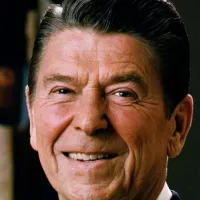
Ronald Reagan the th U S President - was a...
The United States of America is a federal republic located...
California is a U S state on the Pacific Coast...
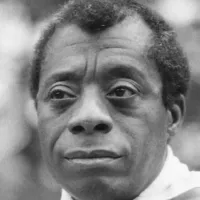
James Baldwin was a prominent African-American writer and civil rights...
The Union of Soviet Socialist Republics USSR existed from to...
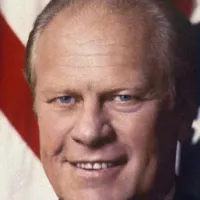
Gerald Ford the th U S President served from -...
Trending
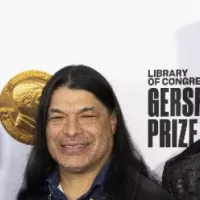
2 minutes ago Metallica Announces Sphere Las Vegas Residency: 'Life Burns Faster' Concert Series in 2026

1 hour ago Priyanka Chopra Jonas stars in 'The Bluff,' a gritty pirate action movie.

1 hour ago Lupita Nyong'o Shares Fibroid Struggle, Advocates for Women's Health in New Campaign
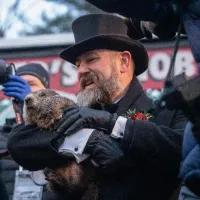
3 hours ago Souvenir Shop Manager Reflects on Final Groundhog Day with Punxsutawney Phil
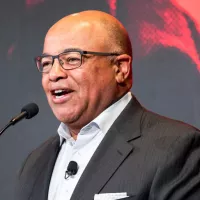
3 hours ago Mike Tirico's Inspiring Olympic Sign-Off: A Look at His Legacy in Sports Broadcasting.

3 hours ago Benny Blanco's Dirty Feet Video Sparks Internet Outrage and Divorce Suggestions for Selena Gomez.
Popular

Jesse Jackson is an American civil rights activist politician and...

Susan Rice is an American diplomat and public official prominent...

Barack Obama the th U S President - was the...

Michael Joseph Jackson the King of Pop was a highly...

XXXTentacion born Jahseh Dwayne Ricardo Onfroy was a controversial yet...

Bernie Sanders is a prominent American politician currently serving as...



